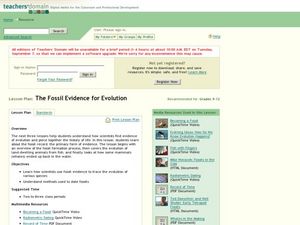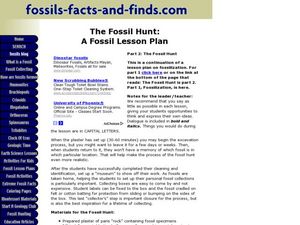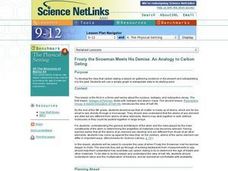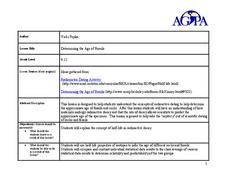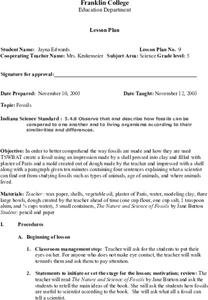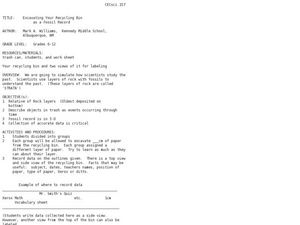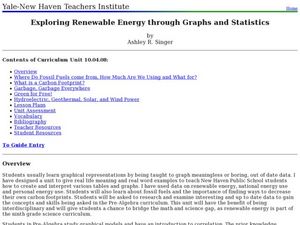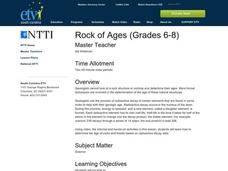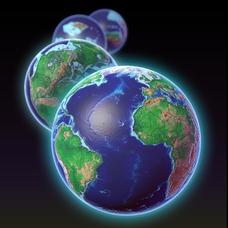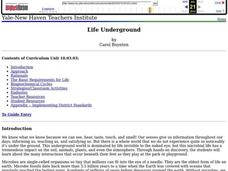Curated OER
The Fossil Evidence for Evolution
High schoolers examine how scientists use fossil evidence to trace evolution of various species and methods used to date fossils.
Curated OER
Finding the Ages of Rocks and Fossils
Students practice dating fossils. They learn the concept of "deep time"--that earth was formed billions of years ago. They experience excellent hand-outs and virtual age tutorial links.
Curated OER
The Fossil Hunt
Students recall prior knowledge of the process of fossilization. For this fossils lesson, students first create and at a later date, recover fossils. Students understand the painstaking process of recovering a fossil. Students recover...
Curated OER
Fossils Footprints Across Time
Students examine fossils to understand how they are formed and how they give information about geological history. In this fossil lesson, students research and write about fossils and make models of different fossil types.The PDF...
Curated OER
The Fossil Evidence for Evolution
Students explore how scientists use fossils to explore how various species have evolved over time. In this fossil lesson students study how to date fossils.
Curated OER
Examining the Fossil Record
Students create an evolutionary tree based on fossil morphology and their ages. In this fossil record lesson plan, students are given 23 pictures of fossil. They study their morphology and arrange the fossils by age and structures on a...
Curated OER
Frosty the Snowman Meets His Demise: An Analogy to Carbon Dating
Learners read and discuss an article about carbon dating, then participate in a hands-on lab to discover how carbon dating works. Students also write a letter to a friend explaining the process, and how archeologists use the process to...
Curated OER
Determining the Age of Fossils
Students examine the concept of radioactive dating. In this radioactive dating lesson, students investigate how to determine the ages of fossils and rocks as they learn about half-life radioactive decay.
Curated OER
Fossils
Fifth graders create a fossil using an impression made with a shell pressed into clay and filled with plaster of Paris and a mold made out of dough and impressed with a shell. They also will receive a paragraph which contains four...
Curated OER
Fossil Inferences
Fourth graders use their knowledge about fossils to arrange fossil pictures in sequence from oldest to youngest. They explain how fossils can be used to make inferences about past life, climate, geology, and environments and discover...
Curated OER
Dinosaur I Finding And Dating
Students investigate how long dinosaurs lived on Earth and how that compare to how long man has been on Earth. They discover how scientists excavate fossils.
Curated OER
Excavating Your Recycling Bin as a Fossil Record
Students explore how scientists examine the past and use rock layers with fossils to understand the past. In this excavation lesson plan students divide into groups and complete an activity.
Curated OER
Exploring Renewable Energy Through Graphs and Statistics
Ninth graders identify different sources of renewable and nonrenewable energy. In this math lesson, learners calculate their own carbon footprint based on the carbon dioxide they create daily. They use statistics to analyze data on power...
Curated OER
How Old Is Mike?
Students examine the absolute dating of fossils, they use a list of names and ages to determine the difference between relative age and absolute age. They explore the relative age and absolute age of people and of fossils.
Curated OER
Rock of Ages
Students use a video, the Internet and hands-on activities to explore how to determine the age of rocks and fossils based on radioactive decay data.
Curated OER
Understanding the Geologic Timescale
Students identify and analyze how the geologic time scale was developed by investigating 11 periods of time and the vast expanse of time of the Earth's existence. They study their period, determine the important factors indicative to...
Howard Hughes Medical Institute
EarthViewer
Can you imagine Washington DC and London as close neighbors occupying the same continent? Learners will be fascinated as they step back in time and discover the evolution of the earth's continents and oceans from 4.5 billion...
Curated OER
Half Life Lab
Seventh graders model radioactive decay using pennies, collect data from their model, apply scientific visualization techniques to their data and create animated models explaining the concept of radioactive half-life.
Curated OER
Human Effect
Students investigate changes in air quality. In this science lesson, students compare data to determine the air quality. Students explore how humans affect the air quality.
Curated OER
How is Atomic Energy Used Today
Students investigate energy sources by examining photographs. In this atomic energy lesson plan, students identify and describe various pictures and how atomic energy is used in them. Students create a presentation...
Curated OER
Life Underground
First graders build a terrarium in order to observe animal and plant life dynamics. In this biology lesson, 1st graders compare how organisms survive in different environments. They write their observations and analysis in their journal.
Curated OER
The History of Rock and Roll
Seventh graders examine how the different layers of rock show the history of the Earths surface. In this rock lesson students divide into groups and complete an activity using clay.
Curated OER
Law of Superposition
Students identify the law of superposition and it states that beds of rock in a series are laid down with the oldest at the bottom and younger layers on the top. They construct a legen for a block diagram and construct a block diagram...
